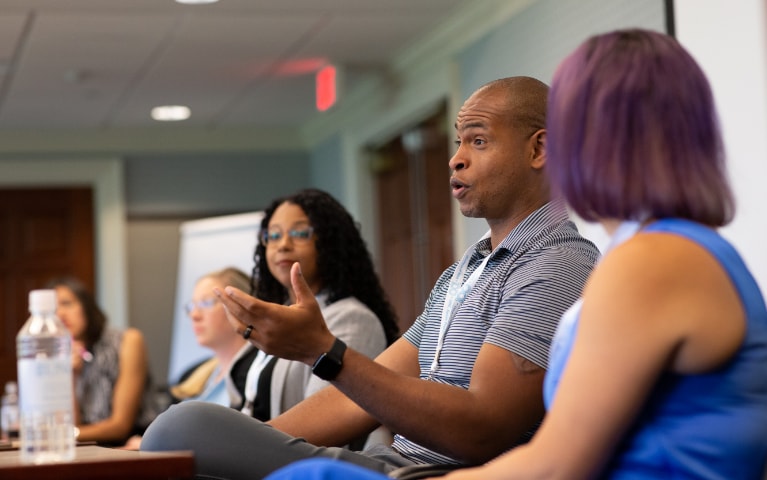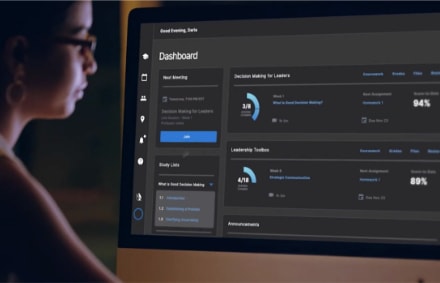
MBA@UNC TRANSFORMS
HIGH ACHIEVERS
INTO AGILE LEADERS

A world in constant flux demands leaders who can solve complex problems with skill, compassion and agility.
With MBA@UNC, the online MBA program from UNC Kenan-Flagler Business School, you can build the powerful network and leadership skills you need to analyze problems, strategize responsibly and build mission-driven organizations.
Ranked #3 in August 2024 by U.S. News & World Report, MBA@UNC prepares business leaders who are focused on both the bottom line and the greater good.1 If you’re ready to take the next step, request more information about UNC Kenan-Flagler’s online MBA program by filling out the brief contact form.
We’ve created this resource to help you gather insights straight from the people who are engaging with our program and community daily.
Below, read what our students, faculty and alumni have to say about our top-ranked online MBA program, and learn how MBA@UNC can prepare you to become an agile leader in and out of the workplace.
What are you interested in exploring?
Frequently Asked Questions from Prospective Students
As you consider MBA@UNC, we know you have important questions. Below, find answers to the most common questions our Admissions Counselors receive from prospective students like you.
As an online student, can I still network on campus?
You’re welcome to visit campus any time and network with students, faculty and alumni! We recommend exploring networking events and career and leadership services specifically for our Online MBA students. Through the online format, we craft a unique experience that primarily lets you connect and network virtually with working professionals. Summits are the perfect opportunity for you to connect with professors, classmates and alumni in person. Learn more about networking opportunities for online students from an alumna below.
Are career services available to students?
As an MBA@UNC student, you will be assigned a personal career coach one month into joining the online program. Because most of our students are working full time, a one-on-one approach is beneficial for career development. We recommend watching a recording of our Career Management online information session hosted by Kelly Noble to learn more about these services.
What are other students’ experiences like?
Given the diversity of curriculum and resources in our program, each student has their own unique experience. Read about MBA@UNC student Jessica Ridlen’s experience or learn more from alumnus Janine Caffrey below. For more student stories, visit our Student & Alumni Profiles page. If you’re interested in speaking with a student or recent graduate, please reach out to your Admissions Counselor to set up a call.
What opportunities are there to grow professionally and personally?
In our program, you may be able to grow your professional career and network while also expanding your skill set. The format brings you to the center of intimate conversations with working professionals and experts in the field every week in our online classroom. We host networking and seminar-like events throughout your time in the program, making it nearly impossible to graduate without growing in some capacity. Read about MBA@UNC student Saad Usmani’s experience below.
What types of instructors will I be learning from?
You’ll learn from on-campus faculty and professors in practice located around the globe. Students are always pleasantly surprised to learn the online learning format unlocks access to an even broader range of expertise. To see a professor in action, ask your Admissions Counselor to schedule a class visit.
Student Story: Why Jessica Ridlen Chose MBA@UNC

Ridlen shares how MBA@UNC helped her become a valuable leader in and out of the workplace and achieve one of her goals of moving away from gut decision-making.
When Jessica Ridlen decided to pursue an MBA about three years ago, she searched for a program with “a curriculum that would stretch her” and help her shun gut decision-making, though it had served her well in her career. She hoped to graduate with relevant knowledge and skills that would enable her to make more informed decisions as she moved into director-level positions.
Career Outcomes from the Tar Heel Network
In May 2020—even before graduating—that’s what she got. In addition to securing a new gig with biotechnology company Genentech, where she manages a cross-functional team of account, contracting, and reimbursement managers, Ridlen is in the early stages of a consulting relationship with Heifer International, a nonprofit specializing in sustainable agricultural development for small farmers around the world.
“I took a social entrepreneurship class and an alumnus connected me to the CEO of Heifer,” she says.
She was required to write a paper about a social enterprise. After profiling Heifer International in a Medium article, Ridlen approached her contact at the organization to propose a consulting relationship. And they were on board.
Having the support of world-class faculty when putting together passion projects or real business endeavors like this one is something that Ridlen doesn’t take for granted. She believes it’s one of the things that makes the MBA@UNC program unlike any other MBA program. Apart from faculty, students have a variety of points of contact: student support services, alumni and classmates. Each serves the student in a unique way.
But being able to put the concepts discussed in the classroom into practice right away remains one of the biggest selling points for Ridlen. Another is the program’s core values.
What It Means to Be a Leader with Integrity
Integrity has always been part of who Ridlen is. But as a second-year student in the online MBA program offered by UNC Kenan-Flagler, she’s come to realize that integrity is not just about maintaining moral uprightness in the face of adversity and adhering to organizational values. At their core, business leaders with integrity are self-aware, confident and possess the ability to refine their mindsets. Most importantly, they don’t tire of “walking the talk.” These traits allow them to build long-lasting trust with the people they manage.
Below is the % of business and talent management employers who believe the following skills make a good leader:
72%
Empowers Others
52%
Thinks Strategically
52%
Builds Trust
35%
Embraces Change
Source: 2016 McQuaig Global Talent Recruitment Report and Survey of 483 employers

Connecting with UNC Kenan-Flagler’s Core Values
Available online since 2011, MBA@UNC is now the #3-ranked online MBA program by U.S. News & World Report. Integrity is just one of the core values that makes this possible, says Alison Fragale, associate professor of organizational behavior and faculty director, MBA@UNC. Excellence, leadership, inclusion, community and teamwork are the other five. From live classes to asynchronous course content to in-person Summit experiences, students are trained to live out these core values day-to-day and leverage them to advance in the business world.
Ranked #3 Online MBA
Build Lasting Relationships with the UNC Network
Start connecting with some of the sharpest business minds in the world at UNC Kenan-Flagler. Learn more about leadership development at MBA@UNC.
How the MBA@UNC Curriculum Prepares Leaders to Adapt
MBA@UNC student Saad Usmani and faculty members Mark McNeilly and Alison Fragale discuss the curriculum and the skills you will gain in the program.
Adapting as a Health Care Leader
Saad Usmani, a physician with Atrium Health, says the program’s curriculum has taught him resilience and adaptability—two indispensable skills for health care industry workers, especially those on the front lines of the COVID-19 pandemic.
“We’ve had to interact with silos that we didn’t even know existed within the organization, and come up with a game plan to move forward,” he says. “This game plan was changing by the minute as we were getting more data.”
Then, there are the everyday complexities that come with making sure a business operates smoothly—from prioritizing goals to navigating and boosting diversity in the workplace, especially at the decision-making table. Diversity in thought, professional training, race, ethnicity and sex all come to play on Usmani’s team.
Two courses in particular have helped him on the job: Leading in the Middle and Leading Diverse and Inclusive Organizations. Now, because of these courses, Usmani says he’s finding ways to engage with employees in different domains of the organization and steer them toward a common goal.
More importantly, he’s identified his own unconscious biases. While clinicians like Usmani interact with people from all walks of life on any given day, they are not immune from implicit biases. Allowing those biases to fester can be detrimental to patient-provider relationships as well as employee relations. That’s why it’s important for Usmani to be intentional about highlighting shared humanity in each of his interactions—and that has helped him build resilience and adaptability, he says.
Teaching Strategies and Philosophies
Professors have different ways of helping students understand complex business concepts and how they can apply those concepts in a range of corporate settings.
Mark McNeilly, who’s been a full-time faculty member since MBA@UNC’s inception, uses his book Sun Tzu and the Art of Business: Six Strategic Principles for Managers to do so. In it, he explores famous Chinese general Sun Tzu’s military strategies, likening them to 21st century business practices.
“Both warfare and business are competitive situations,” McNeilly says.
He says he often kicks off his Sales class by introducing a military strategy, such as flanking attack. Next, he provides historical examples in which this strategy was used to defeat an enemy in battle. He follows that with a business example where the same strategy is used to attack an opponent. Then, he concludes by quizzing students or engaging them in discussion.
To help her students grasp and retain the negotiation skills she teaches, Fragale relies on her teaching philosophy, comprising three pillars:
Education
Think business concepts, strategies and best practices. As Fragale puts it: “Education has to do with facts, research, the science of business … basically, what we know.”
Entertainment
Fragale asks herself how she can make the course content fun for students. Without elements of fun, Fragale says students may fail to engage with the course content and one another, or easily forget important concepts brought up in discussions.
Experience
Fragale describes negotiation as a “learning-by-doing type of skill.” So, whether students are negotiating salary for a new job, negotiating an international business deal or negotiating naptime with their toddler at home, she wants them to practice the techniques she teaches, over and over.
Fragale uses timely, everyday examples to teach her students about negotiation. One of her more recent examples is tied to the COVID-19 pandemic. Since March, millions of Americans have lost their jobs. As the economy gradually reopens, Fragale shares some tips for negotiating a new job. Those tips include reframing your narrative to display authentic strength.
While negotiation isn’t unique to the corporate world, Fragale says the strongest and most valued leaders have mastered the art of negotiation and use it to boost their marketability.
How Learning Technology Connects People in a Global Society
Online learning isn’t new, but you want to be confident the online program you’re about to apply to prioritizes and optimizes your experience. Learn about tech’s role in MBA@UNC’s program and how it allowed students Jessica Ridlen and Saad Usmani to build an unexpected friendship.

Fragale and her colleagues use Zoom video conferencing for real-time lessons and one-on-one office hours. This format is particularly useful for today’s business leaders—many of whom have been forced to lead remotely because of the pandemic, says Fragale.

In addition to being observant, overtly emotive and intentionally communicative, Fragale says instructors and managers should have a firm grasp on the ins and outs of digital tools like Zoom. Using features like breakout rooms allow for small-group discussions.

Outside of class, students can review asynchronous course content. And often, they get together in their free time for study groups, to collaborate on assignments or simply to enjoy each other’s company.
Fellow students Ridlen and Usmani have become close friends. The two were even training for the New York City marathon until it was called off in June.
“Going in, I didn’t realize how much the program would focus on people and relationships,” says Ridlen. “I would have never thought that I would run my first marathon ever with people in my program.”
Because students are scattered across the country and the globe, Ridlen says there are multiple opportunities to learn about management styles and business dealings through the lens of culture.
Q&A: Advice to Prospective Students from Alumna Janine Caffrey

UNC Kenan-Flagler’s alumni community continues to grow, with 17 chapters in the U.S. and one in the U.K. Staying connected with alumni has many benefits, including job referrals. Janine Caffrey, who graduated from the program in 2019, shares her experience and tips for those considering the program.
Q: What information can you give to people who are skeptical about online learning?
A: To me, online learning, at least the way it’s done through MBA@UNC, is better. You’re not dealing with traffic on your way to class, you’re not dealing with if you’re sick or have child care issues. There are other things you don’t have to deal with when you’re taking classes online, so I think it reduces the overall stress level quite a bit. And I love the motto: “no back row.” You cannot hide in those classes. You have to be there and be engaged or you’re not going to do very well.
Q: What advice can you give to individuals who are considering the MBA@UNC program?
A: Take advantage of orientation for sure. Orientation was a huge game changer for me. It allowed me to meet people and develop relationships even before classes started. It also gave me a taste of what coursework would be like. And as an older student, one in her 50s, it gave me confidence because I felt a little intimidated knowing that most of my classmates were younger than me. At orientation, I realized that I actually had a lot to offer as a more experienced professional.
Q: Once someone is accepted into the program, how can they prepare for the learning experience?
A: They can do a couple of things, starting with managing their schedule. Think about what you can give up in your life for the duration of the program or what you can move around. The extensive coursework load won’t leave you with a lot of free time.
Let’s say you’re on a softball league and it’s the thing that kind of gives you the juice to get through life. You meet multiple times a week, but summer is a big season for games. Maybe you won’t be able to make all the weekly meetups like you used to, but you can take a lighter course load in the summer so that you can participate in the games.
For me, I ended up taking a new job in the middle of my program. I knew that it was going to be a little rough, so I scaled back on my coursework for that particular quarter. That’s all part of the beauty of the program.
Talk to significant others. Not just your partner. If you’re taking care of parents, let them know that you need to arrange your schedule in a way that supports your studies. Have those conversations and make those changes at least two weeks before classes start.
Orientation is a good time to identify people who you would want to work on projects with. Identify teammates who have the skills you don’t. So, if you’re good at communication and your background is in writing, you’ll want to find somebody who’s more of a quantitative thinker.
Q: Students in the program come from a variety of professional backgrounds. How did you leverage this type of diversity and how can aspiring students do the same?
A: Broadening your network across industries is really important for a variety of reasons. You want to make sure that you can switch jobs if you have to. For example, if you’re in the travel and tourism business and you have lost your job because of the [COVID-19] pandemic, you’re probably looking for work in a different industry. And so, you want to make sure that you have a pretty robust network across other segments.
The other thing that I’ve really appreciated about that diversity is that it’s given me the opportunity to talk to so many people about what they do. I started out my career as a special education teacher and I went through over 30 years of teaching and leading schools before deciding to move from being an educator into the education technology space. I knew I needed to increase my skill set in the area of business as I made that transition, but I still wasn’t totally clear on what I wanted to do with education technology. By talking to students who did all kinds of things, I got a better idea of my career path. I asked them what it’s like to work in finance, what it’s like to be in consulting, what they do on a daily basis.
The thing that’s quite amazing about the alumni and current students in this program is that I have never had anyone say no, and I had a lot of career informational interviews and asked for a lot of help. I’ve asked people to introduce me to people at their company and help me prepare for job interviews.
Q: Apart from Summits, what other networking opportunities can students expect?
A: There are informal social media groups that are really, really helpful. You meet a lot of people—full-time students and graduates—through those groups. Most cities where there’s a significant number of alumni have meetups, like happy hour on Fridays. I’m near New York City so I’ve taken advantage of those. There’s a Women at UNC Kenan-Flagler group and other special interest groups.
More MBA Resources and Links
Want to learn more about UNC Kenan-Flagler or MBA@UNC? These pages provide program-specific information:
MBA@UNC Admissions Requirements (GRE/GMAT waivers are available)
If picking a specific school isn’t at the top of your priority list, you can refer to this collection of resources to learn more about leadership in business and how an MBA can help you reach your career goals:
Leveraging Value-Driven Leadership in Business, at Home, and in Your Community
Ready to take the next step?
MBA@UNC can help you transform into a strategic, effective and agile leader.
1 https://www.usnews.com/education/online-education/mba/rankingsarrow_upwardReturn to footnote reference


